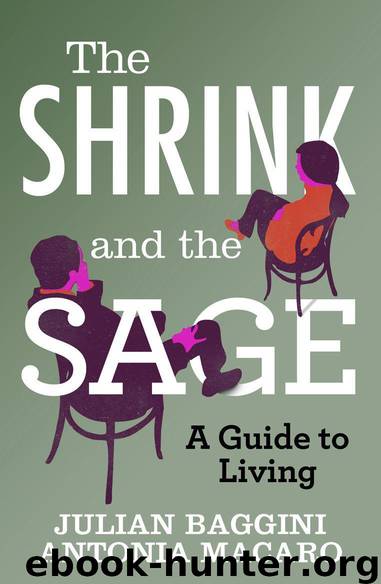The Shrink and the Sage by Julian Baggini & Antonia Macaro

Author:Julian Baggini & Antonia Macaro
Language: eng
Format: mobi
Tags: Financial Times, psychotherapy, philosophy, life’s dilemmas, Self-Help
Publisher: Icon Books
Published: 2012-05-02T23:00:00+00:00
ON SELF-DECEPTION
The Shrink
That human beings are able to deceive themselves is clear. The examples are abundant: falsely believing that our spouse is faithful, that our romantic intentions are reciprocated, that we stand a good chance to pass an exam or succeed in a career, that we behaved well in an awkward situation. And believing all these things not only without sound evidence, but with good hints and signs to the contrary, which we should be able to get but somehow manage to overlook. We deceive ourselves about our motives, abilities and prospects all the time, going to great lengths to shield ourselves from painful realisations and maintain our beliefs in comforting untruths.
This has always seemed like a puzzling phenomenon, which raises several questions about how this is possible, whether it’s a good or a bad thing, to what extent it can be avoided. Much has been written about all this. But what should we do about it? If we’re self-deceived we’re by definition ignorant of the fact: why shouldn’t we be allowed to bask in our blissful unawareness? If you were deceiving yourself, would you want to know?
There are reasons why we might be tempted to embrace self-deception wholeheartedly. A certain amount of it is probably harmless, and arguably good for us. An over-inflated view of ourselves may help us to pursue more ambitious goals and overcome obstacles. It may create virtuous cycles that increase the likelihood of success. Or it may simply allow us to cope with living without becoming too mired in misery. Several studies have suggested that moderately self-deluded people are happier and more successful, while realism is correlated with depression.
That is no mean advantage. It’s almost enough to make us want to become more rather than less self-deceived, even though on the other side lurk dangers like faulty judgements about the world, excessive expectations opening the possibility of extreme disappointment, and catastrophic decision-making.
Even more importantly, it seems there’s no way of escaping this self-delusion. We’re all ailing with a mild form of it. Most people overrate their abilities in all sorts of contexts, from driving ability to intelligence and moral character. So should we accept that self-deception is just our human lot?
Notice however that we’ve been talking about moderate self-delusion. I assume not many people would opt for the full-blown variety, like believing you’re the queen, or that the CIA is after you. It’s fair to think that this kind of delusion would lead to all sorts of negative consequences, and almost certainly get in the way of functioning properly and having a good life.
There is a large grey area between this and the moderate self-deception that is supposed to be so advantageous. But the dangerous territory begins as soon as we stray from slight over-optimism to believing something in the face of contrary evidence. Perhaps there is a line to be drawn somewhere around there. But self-deception is insidious, and keeping it in check difficult. Even if it’s true that a small amount of delusion
Download
This site does not store any files on its server. We only index and link to content provided by other sites. Please contact the content providers to delete copyright contents if any and email us, we'll remove relevant links or contents immediately.
The Compound Effect by Darren Hardy(8943)
Wonder by R.J. Palacio(8569)
Atomic Habits: Tiny Changes, Remarkable Results by James Clear(8326)
Becoming Supernatural by Dr. Joe Dispenza(8200)
Wonder by R. J. Palacio(8097)
Change Your Questions, Change Your Life by Marilee Adams(7758)
The Road Less Traveled by M. Scott Peck(7594)
Born to Run: by Christopher McDougall(7120)
Daring Greatly by Brene Brown(6501)
Big Magic: Creative Living Beyond Fear by Elizabeth Gilbert(5754)
Grit by Angela Duckworth(5604)
The Slight Edge by Jeff Olson(5410)
Men In Love by Nancy Friday(5234)
The Wisdom of Sundays by Oprah Winfrey(5153)
You Are a Badass at Making Money by Jen Sincero(4923)
Fear by Osho(4727)
The Miracle Morning by Hal Elrod(4711)
The Four Tendencies by Gretchen Rubin(4594)
Rising Strong by Brene Brown(4449)
